Coming originally from Un'Goro, quests have always been in a somewhat interesting spot in terms of meta viability for numerous reasons. Compared to a normal card, which usually boils down to whether the stats or effects are strong for the mana, quests affect almost every aspect of a deck when you play with one. To get a better understanding of the impact the new questlines will have, let's first go over the different impacts running a quest has, these being taking a card slot in the mulligan, affecting early game tempo, building a deck to be able to complete the quest, and finally the reward.
The Mulligan
While having the quest start in the player's starting hand is vital to make the entire deck work as a whole, this also hurts matchups that are more reliant on drawing into a certain card, such as a control deck that wants to draw into board clears early on. For the sake of this example, let's look at School Spirits and say that we want to have drawn it by turn 3 to clear off the opponent's board. If we went first and kept a quest, we would see a maximum of 8 cards assuming a full mulligan in addition to not drawing any additional cards. This leaves roughly a 53% chance that we do not find either copies of School Spirits. Assuming the same circumstances, but this time without a quest, we would see a maximum of 10 cards which lowers the chance of missing to 44%, which still is not the best, but is still almost a 10% decrease compared to the variant running the quest. Going second does help with finding the desired card, but having a quest still brings down the chance of missing from 39% to around 48%. When you factor in that more often than not a full mulligan for one specific card is typically not a great idea, the odds of finding the desired card drops even lower. In order for a quest to be worth running, it should either be able to justify having poor matchups, such as The Caverns Below folding under aggressive decks in order to almost assuredly defeat any midrange or control decks, or needs to be more well-round to not suffer from polarized matchups that depend on a single card, such as Fire Plume's Heart consitency across most of the field in early Un'Goro.
Being relatively straightforward in design, stopping aggro dead in their tracks, and then finishing the opponent off with DIE, INSECT! led to an early dominance in the meta game.
Impact on Early Game Tempo
Given how important quests are for the game plan of a deck, most turn 1 plays are going to consist of playing it and passing the turn back to the opponent. While not usually an issue against control decks, which most quests prey upon, this does forfeit any chance of tempo you could get against any aggressive decks. Most times a quest deck will have to play the game reactively, which gives way for more proactive decks to steal the game away, which is a similar concept to what happens in traditional aggro vs control matchups. This is the factor that tends to suppress most quest decks in the past as there simply is not enough tools to counteract the more aggressive opponents. The ways a quest can deal with this issue is either by embracing the control nature of quest decks, seen by Supreme Archaeology, outspeeding aggressive decks, as with Open the Waygate in wild, or just taking the Quest Rogue approach of having some horrible matchups that get outweighed by numerous free matchups.
Quest Warlock was mocked when it first came out, but once a couple strong control tools were printed, Tome of Origination became a great finisher with Malygos and Alexstrasza
Deck Creation
The clearest impact a quest has on a deck is through the creation process. Due to having to jump through a hurdle in order for the deck's main win condition to become active, most quest decks are forced to run lots of redundancy to make sure that you can stay on track to complete it in a reasonable time. Despite being the most obvious factor on deck creation, most quest decks are very linear in terms of creating them, and thus easy to build. Unfortunately, this is a double-edged sword, especially in an unrefined meta game. When an opponent sees Corrupt the Waters being played turn one, it is significantly easier to know what to play around since the deck is going to synergize around completing or taking advantage of the reward. A similar issue persists later on once metagames get fleshed out as well since a turn 1 quest tells the opponent almost exactly what your game plan is, and thus also how to combat it. One important thing to note is that certain quests are much easier to include than others. Something like Bazaar Burglary, which can be completed in as little as two cards, requires less of a deck building cost than something like Unite the Murlocs, which takes a bit more than two cards. Ultimately, a quest either lives or dies in deck creation and so if the support is there, most likely the quest will be viable in some capacity.
While never being a tier 1 deck, Bazaar Burglary was very consistent in being finished thanks to cards such as Clever Disguise finishing half of the quest.
Rewards
The final part of a quests viability is based on the reward. A strong reward can justify jumping through hoops in order to complete while weaker rewards tend to kill a quests viability entirely. This raises the question of what makes a reward strong or weak, which can be boiled down almost entirely by the impact it has in the immediate future. Untapped Potential is one of the strongest examples of this, letting the player almost immediately back into the game with cards such as Oasis Surger or Hidden Oasis. While this feels a bit silly to say, typically a quest reward that wins the game quickly is a good reward. Theres been several quests that I'd label as "slow value" quests (such as Lakkari Sacrifice, Hack the System, and The Marsh Queen) that are bent on making each subsequent turn a little bit stronger, and out of all of them, the only two that has been even somewhat viable were Corrupt the Waters, which is great, and Jungle Giants which was mostly off the back of Ultimate Infestation which just let you win on the spot. To put it simply, the reward needs to be strong enough to put on some reasonable paced clock on the opponent.
Ossirian Tear was such a strong reward for druid that they could afford to lose the board in the early turns only to steamroll the mid to late game.
How Questlines Differ
Now that we have a decent understanding of how quests have impacted deckbuilding and the meta in the past, how do questlines differentiate from this? There are two main differences, these being that questlines tend to take a longer time to complete, but also rewards the player by reaching certain thresholds. This somewhat fixes the issue of low early game impact given that the player gets payoffs sooner than with a traditional quest. In turn, the longer completion time hurts in the rewards aspect, requiring the final questline reward to provide more of a punch.
Questlines are in an interesting spot where the player can get value as you progress instead of having it be all or nothing like the quests in the past.
Wrap Up
To wrap everything up, let's summarize the 4 main limiters of a quest and how they impact how a quest deck plays. By nature, quest decks have a worse mulligan than normal decks, which leads to more matchup polarization or making a deck more well-rounded and thus, a little bit weaker to matchups across the board compared to a deck with proper techs. The lack of a proper turn 1 play means that most quest decks need to have some form of board recovery option against more aggressive decks or that will lead to more matchup polarization, and finally, the quest cannot be too limiting to force one to run bad cards and has to have a payoff that justifies running other cards in the deck. A quest does not need to excel in all of these categories, but typically they need to have some way of addressing them to see the light of day.
Questlines definitely pose as an interesting alternative to the normal quests, but the question of whether they will be able to overcome the 4 main fundamental challenges of quests will be something we will have to see when the set launches. That being said, make sure to join me next time when we dive head first into theorycrafting and try to figure out how whether any of these will be a breakout star of the next expansion!


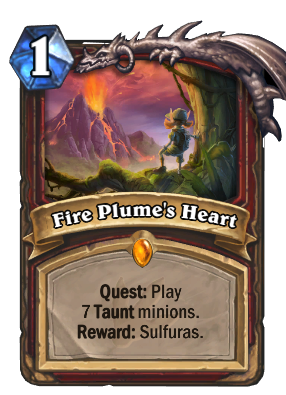
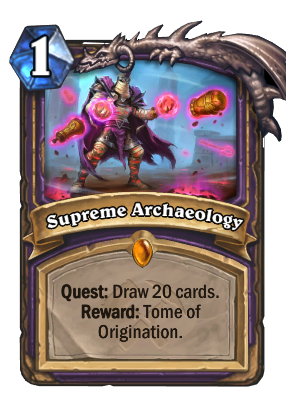
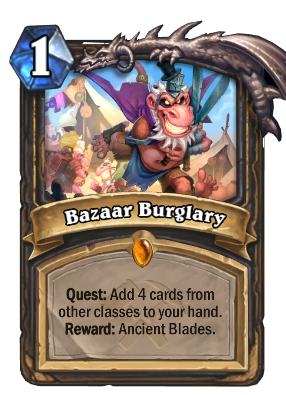
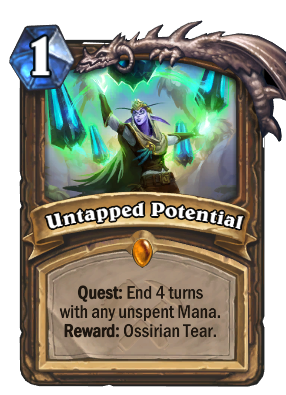
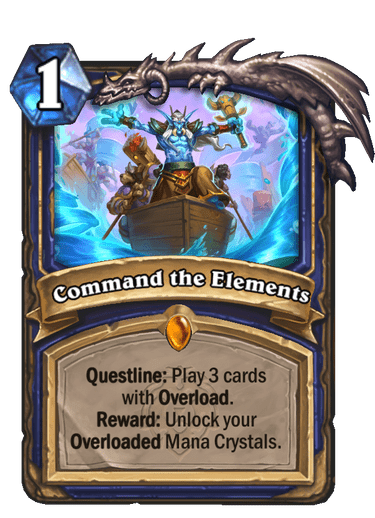
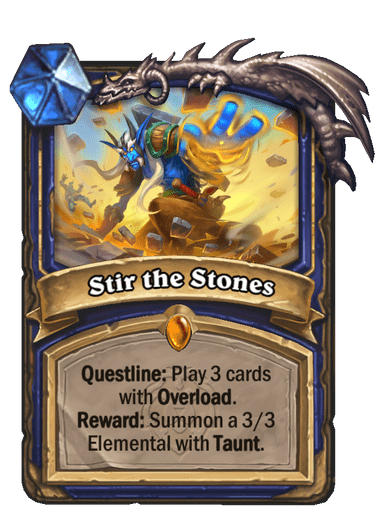
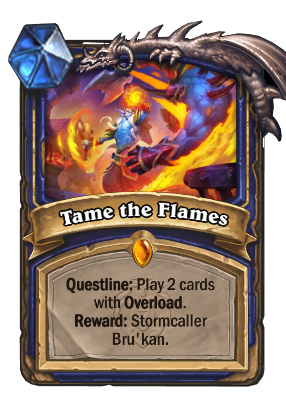






Comments
Obviously, these quests are pretty slow, but having to put in a lot of effort to complete them is fine. What isn't fine is how slow the rewards are. For many of the quests you have to play roughly 8-9 cards, then play a 5 mana 7/7 with no keywords, and all they do is enhance your future plays.
By the time these are completed, unless you are in a long and grindy control vs control matchup, the game will be almost over. But you have to keep playing more cards to actually utilize the reward. In most cases, the final reward will be obsolete.
Does this mean I dislike the questlines? No, I think their awesome and will likely craft 2-3 of them within the first week. But I don't have a lot of hope for many of them becoming tier 1.
The quests in stormwind is slow, like really slow. To offset this, team5 have properly made it so the different tiers gives out some rewards to compensate but after looking at the theorycraft stream I think its safe to say that:
- Very frequently you'll win/lose before you get the full quest reward done. In my view this problem is currently plaguing priest and mage the most. Quest priest decks are in fact midrange decks which stupidly enough actually looks like it can win the game without even relying on the final reward. Mage on the other hand, well, let's be honest it'll be a spell mage deck and with cards like Ignite and Hot Streak I've no doubt the game will end way before you get to play the reward at all.
- Some decks will just play the quest because they can, not because the quest actually wins the game. Druid for example will be playing plenty of the quest but don't expect Guff to ever win you the game. Cenarion Ward, Arbor Up and Glowfly Swarm will be doing the actual winning here. Its somewhat amazing, but I really think druid's quest is probably the better of the lot.
- Overall, in my opinion the quests will be fully completed by around turn 6-7, with the exception of druid and paladin. Will be interested to see how many times I will actually be playing those 5 mana rewards without getting my teeth kicked in.
- I think we'll be seeing some good archetypes off from stormwind. The sad thing is that I don't think they'll be quest decks. Shadow priest, control corrupt shaman, a new spell mage, and strangely boar rogue may actually come out good from this set.
One of the best analyses I've seen on this site, and sorely needed since we had a limited amount of time to view the whole set.
To go a little bit further following your final paragraph, here are a few of my impressions after watching the theorycrafting streams yesterday (overall, I watched four live over 3 hours yesterday, and two more VODs over 2 hours this morning):
- Warlock quest: Excellent against midrange and slower decks, but very weak to aggro. Don't bother with Neeru Fireblade; just pack your deck with removal and board clears (such as Entitled Customer), as well as healing (Spice Bread Baker) and burst opponents with your own fatigue damage once you exhaust your deck.
- Warrior quest: Forget assumptions about pirate warrior being aggressive; The Juggernaut is an infinite value engine that makes this deck the perfect midrange deck. Keep a low curve to finish the quest as quickly as possible while answering early threats. Once your boat is on the board, just grind your opponents down.
- Druid quest: Inconsistent quest completion, which points to not having enough support for it, at least for now. The reward is also underwhelming. (*I just remembered something important: There seems to be a bug with Guff that causes the opponent to disconnect, although it's not instantaneously apparent -- you need to mouse over the board to notice it. Kibler ran into this multiple times, which caused him to lose precious time during crucial turns. Presuming Blizzard doesn't correct this by launch day, players who want to cheese a few wins might want to try this quest).
- Priest quest: Early turns tend to be decent, but often struggles in the mid-game by having limited options in the high-mana slots (for example, playing a Lorekeeper Polkelt on turn 7 because the player needed to play a 5-drop).
- Rogue quest: While the gizmos are more powerful than lackeys or spare parts (each has an effect worth about 2.5 mana), they are only the support section of your deck, not its main focus. Overall power level is equivalent to current tempo rogue.
- Mage quest: Best as a variation on Incanter's Flow mage, with the same matchup stats.
You missed out on dhunter, shaman and hunter in your list. Watch dekkster's stream for hunter, I think he played a good deal of that yesterday. It may not be tier 1, but its certainly a fun deck that can win.
As I explained in my preamble, I had a limited time to watch the streams, and I didn't see enough games played with the missing classes to form an opinion.
Side note: Regis Killbin has just released this video where he ranks the various questlines based on his own experience during the theorycraft streams.
Thanks Echo, this was a fun read!
Glad you enjoyed it! More to come soon.